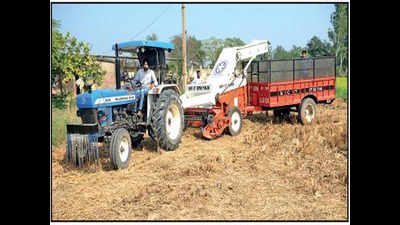- News
- City News
- delhi News
- Haryana supplies machines well, Punjab stuck at 30%
Trending
This story is from November 11, 2019
Haryana supplies machines well, Punjab stuck at 30%
A significant difference in delivering stubble management machines to community centres might mark the reason why Haryana has been able to reduce incidence of farm fires while Punjab shows an increase.

TECH HELP: IIT Ropar has launched a commercial version of a stubble-removal machine, which can cut and collect crop residue in a trolley in one go
NEW DELHI: A significant difference in delivering stubble management machines to community centres might mark the reason why Haryana has been able to reduce incidence of farm fires while Punjab shows an increase.
Haryana has been able to achieve almost full delivery of straw management systems at custom hiring centres (CHCs) at 99.6% while the data for Punjab shows 30.7%. The CHCs are tasked with hiring out machines to farmers and are an important link in the effort to control stubble burning ahead of the sowing of winter crops.
The two states, however, do equally poorly on deliver of machines to individuals. Punjab has achieved 34% delivery while the figure for Haryana is 33%. The two states were expected to reach 7,600 and 15,343 individual farmers ahead of the current sowing season in an effort to reduce pollution in Delhi.
There is a strong link between stubble burning in Punjab and Haryana and pollution in Delhi-NCR, though the intensity depends on the strength and direction of winds. Last week, stubble burning in Punjab was high, but the contribution of farm fires to pollution in Delhi-NCR was as low as 2%.
Punjab and Haryana were to also take steps to ensure that all coal-based thermal power plants, including those in the private sector, use a minimum of 5% of biomass pellets. Though the Centre and states were to prepare an action plan to achieve zero stubble burning by April 30, the action on the ground remains patchy.
The status report also noted actions by Delhi government and municipal corporations to reduce construction and demolition waste and ensure its swift disposal. The acquisition of buses in Delhi has lagged and initiatives to promote electric and hybrid public transport is also behind schedule.
Majority of thermal power plants are likely to miss the deadlines for containing SPM, NOx and SOx emissions.
Haryana has been able to achieve almost full delivery of straw management systems at custom hiring centres (CHCs) at 99.6% while the data for Punjab shows 30.7%. The CHCs are tasked with hiring out machines to farmers and are an important link in the effort to control stubble burning ahead of the sowing of winter crops.
The two states, however, do equally poorly on deliver of machines to individuals. Punjab has achieved 34% delivery while the figure for Haryana is 33%. The two states were expected to reach 7,600 and 15,343 individual farmers ahead of the current sowing season in an effort to reduce pollution in Delhi.
There is a strong link between stubble burning in Punjab and Haryana and pollution in Delhi-NCR, though the intensity depends on the strength and direction of winds. Last week, stubble burning in Punjab was high, but the contribution of farm fires to pollution in Delhi-NCR was as low as 2%.
The states missed the timelines for delivery of machines by October 10 while Punjab was to issue advisories to all CHCs regarding appropriate hiring charges and also develop a mobile app to access the equipment, according to a status report prepared by the central government.
Punjab and Haryana were to also take steps to ensure that all coal-based thermal power plants, including those in the private sector, use a minimum of 5% of biomass pellets. Though the Centre and states were to prepare an action plan to achieve zero stubble burning by April 30, the action on the ground remains patchy.
The status report also noted actions by Delhi government and municipal corporations to reduce construction and demolition waste and ensure its swift disposal. The acquisition of buses in Delhi has lagged and initiatives to promote electric and hybrid public transport is also behind schedule.
Majority of thermal power plants are likely to miss the deadlines for containing SPM, NOx and SOx emissions.
End of Article
FOLLOW US ON SOCIAL MEDIA










